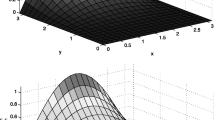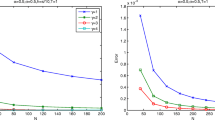Abstract
This article devotes to developing robust and simple correction techniques with efficient algorithms for a class of second-order time stepping methods, namely the shifted fractional trapezoidal rule (SFTR), for subdiffusion problems to resolve the initial singularity and nonlocality. The stability analysis and sharp error estimates in terms of the smoothness of the initial data and source term are presented. As a byproduct in numerical tests, we find amazingly that the Crank–Nicolson scheme (\(\theta =\frac{1}{2}\)) without initial corrections can restore the optimal convergence rate for the subdiffusion problem with smooth initial data and source terms. To deal with the nonlocality, fast algorithms are considered to reduce the computational cost from \(O(N^2)\) to \(O(N \log N)\) and save the memory storage from O(N) to \(O(\log N)\), where N denotes the number of time levels. Numerical tests are performed to verify the sharpness of the theoretical results and confirm the efficiency and accuracy of initial corrections and the fast algorithms.










Similar content being viewed by others
References
Akrivis, G., Li, B., Lubich, C.: Combining maximal regularity and energy estimates for time discretizations of quasilinear parabolic equations. Math. Comput. 86, 1527–1552 (2017)
Alikhanov, A.: A new difference scheme for the time fractional diffusion equation. J. Comput. Phys. 280, 424–438 (2015)
Baffet, D., Hesthaven, J.S.: A kernel compression scheme for fractional differential equations. SIAM J. Numer. Anal. 55, 496–520 (2017)
Chen, H., Stynes, M.: Blow-up of error estimates in time-fractional initial-boundary value problems. IMA J. Numer. Anal. 00, 1–24 (2020)
Cuesta, E., Lubich, C., Palencia, C.: Convolution quadrature time discretization of fractional diffusion-wave equations. Math. Comput. 75, 673–696 (2006)
Ding, H., Li, C., Yi, Q.: A new second-order midpoint approximation formula for Riemann-Liouville derivative: algorithm and its application. IMA J. Appl. Math. 82, 909–944 (2017)
Diethelm, K.: An algorithm for the numerical solution of differential equations of fractional order. Electron. Trans. Numer. Anal. 5, 1–6 (1997)
Gao, G., Sun, Z., Zhang, H.: A new fractional numerical differentiation formula to approximate the Caputo fractional derivative and its applications. J. Comput. Phys. 259, 33–50 (2014)
Gunzburger, M., Wang, J.: A second-order Crank-Nicolson method for time-fractional PDEs. Int. J. Numer. Anal. Model. 16, 225–239 (2019)
Jiang, S., Zhang, J., Zhang, Q., Zhang, Z.: Fast evaluation of the Caputo fractional derivative and its applications to fractional diffusion equations. Commun. Comput. Phys. 21, 650–678 (2017)
Jin, B., Li, B., Zhou, Z.: An analysis of the Crank-Nicolson method for subdiffusion. IMA J. Numer. Anal. 38, 518–541 (2018)
Jin, B., Li, B., Zhou, Z.: Correction of high-order BDF convolution quadrature for fractional evolution equations. SIAM J. Sci. Comput. 39, A3129–A3152 (2017)
Jin, B., Li, B., Zhou, Z.: Discrete maximal regularity of time-stepping schemes for fractional evolution equations. Numer. Math. 138, 101–131 (2018)
Jin, B., Li, B., Zhou, Z.: Numerical analysis of nonlinear subdiffusion equations. SIAM J. Numer. Anal. 56, 1–23 (2018)
Li, B.: Analyticity, maximal regularity and maximum-norm stability of semi-discrete finite element solutions of parabolic equations in nonconvex polyhedra. Math. Comput. 88, 1–44 (2019)
Li, B.: Maximal regularity of multistep fully discrete finite element methods for parabolic equations. IMA J. Numer. Anal (to appear). arXiv:2005.01408
Li, B., Ma, S.: A high-order exponential integrator for nonlinear parabolic equations with nonsmooth initial data. J. Sci. Comput. 87, 1–16 (2021)
Li, C., Cai, M.: High-order approximation to Caputo derivatives and Caputo-type advection-diffusion equations: revisited. Numer. Func. Anal. Opt. 38, 861–890 (2017)
Liao, H., McLean, W., Zhang, J.: A discrete gronwall inequality with applications to numerical schemes for subdiffusion problems. SIAM J. Numer. Anal. 57, 218–237 (2019)
Lin, Y., Xu, C.: Finite difference/spectral approximations for the time-fractional diffusion equation. J. Comput. Phys. 225, 1533–1552 (2007)
Liu, Y., Yin, B., Li, H., Zhang, Z.: The unified theory of shifted convolution quadrature for fractional calculus (2019). arXiv: 1908.01136
Lubich, C.: Discretized fractional calculus. SIAM J. Math. Anal. 17, 704–719 (1986)
Mustapha, K., Mustapha, H.: A second-order accurate numerical method for a semilinear integro-differential equation with a weakly singular kernel. IMA J. Numer. Anal. 30, 555–578 (2010)
Oldham, K., Spanier, J.: The fractional calculus theory and applications of differentiation and integration to arbitrary order. Elsevier (1974)
Sakamoto, K., Yamamoto, M.: Initial value/boundary value problems for fractional diffusion-wave equations and applications to some inverse problems. J. Math. Anal. Appl. 382, 426–447 (2011)
Schädle, A., López-Fernández, M., Lubich, C.: Fast and oblivious convolution quadrature. SIAM J. Sci. Comput. 28, 421–438 (2006)
Stynes, M.: Too much regularity may force too much uniqueness. Fract. Calc. Appl. Anal. 19, 1554–1562 (2016)
Stynes, M., O’Riordan, E., Gracia, J.: Error analysis of a finite difference method on graded meshes for a time-fractional diffusion equation. SIAM J. Numer. Anal. 55, 1057–1079 (2017)
Sun, Z., Wu, X.: A fully discrete difference scheme for a diffusion-wave system. Appl. Numer. Math. 56, 193–209 (2006)
Thomée, V.: Galerkin finite element methods for parabolic problems, 2nd edn. Springer, Berlin (2006)
Tian, W., Zhou, H., Deng, W.: A class of second order difference approximations for solving space fractional diffusion equations. Math. Comput. 84, 1703–1727 (2015)
Wang, J., Wang, J., Yin, L.: A single-step correction scheme of Crank-Nicolson convolution quadrature for the subdiffusion equation. J. Sci. Comput. 87, 1–18 (2021)
Wang, Y., Yan, Y., Yan, Y., Pani, A.K.: Higher order time stepping methods for subdiffusion problems based on weighted and shifted Grünwald-Letnikov formulae with nonsmooth data. J. Sci. Comput. 83, 1–29 (2020)
Yan, Y., Khan, M., Ford, N.: An analysis of the modified L1 scheme for time-fractional partial pifferential equations with nonsmooth data. SIAM J. Numer. Anal. 56, 210–227 (2018)
Yin, B., Liu, Y., Li, H.: Necessity of introducing non-integer shifted parameters by constructing high accuracy finite difference algorithms for a two-sided space-fractional advection-diffusion model. Appl. Math. Lett. 105, 106347 (2020)
Zeng, F., Li, C., Liu, F., Turner, I.: The use of finite difference/element approaches for solving the time-fractional subdiffusion equation. SIAM J. Sci. Comput. 35, A2976–A3000 (2013)
Zeng, F., Turner, I., Burrage, K., Karniadakis, G.E.: A new class of semi-implicit methods with linear complexity for nonlinear fractional differential equations. SIAM J. Sci. Comput. 40, A2986–A3011 (2018)
Zhang, H., Zeng, F., Jiang, X., Karniadakis, G.E.: Convergence analysis of the time-stepping numerical methods for time-fractional nonlinear subdiffusion equations (2020). arXiv:2007.07015
Author information
Authors and Affiliations
Corresponding author
Additional information
Communicated by Mihaly Kovacs.
Publisher's Note
Springer Nature remains neutral with regard to jurisdictional claims in published maps and institutional affiliations.
The work of the second author was supported in part by Grants NSFC 12061053, 11661058 and the NSF of Inner Mongolia 2020MS01003. The work of the third author was supported in part by the Grant NSFC 11761053. The work of the fourth author was supported in part by Grants NSFC 11871092 and NSAF U1930402.
Rights and permissions
About this article
Cite this article
Yin, B., Liu, Y., Li, H. et al. Efficient shifted fractional trapezoidal rule for subdiffusion problems with nonsmooth solutions on uniform meshes. Bit Numer Math 62, 631–666 (2022). https://doi.org/10.1007/s10543-021-00890-z
Received:
Accepted:
Published:
Issue Date:
DOI: https://doi.org/10.1007/s10543-021-00890-z




